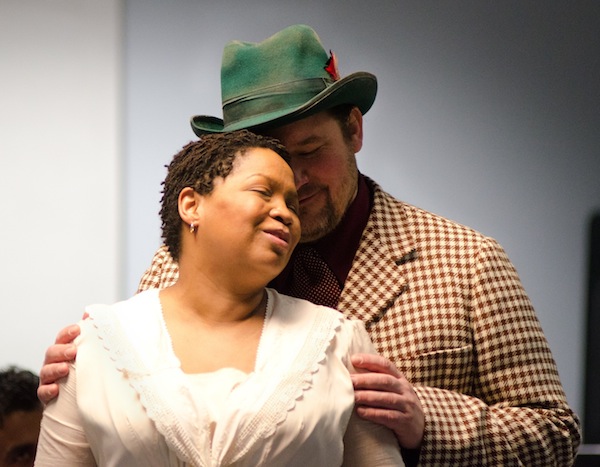
From the heart
By Kira Obolensky, Ten Thousand Things Theater
The unexpected juxtaposition of the opening of Ten Thousand Things’ production of The Music Man at the Wilder Center, a Sufjan Stevens lyric, and the last month of revisions on my newest play inspires this blog post.
Let me explain.
I am driving to Wisconsin and listening to Illinoise, Stevens’ album from 2005. It’s nice background to the rolling landscape. There is something about the sweep of the music that works with the expanse of rolling, cold landscape and it throws the lyrics into bright light.
In “Carl Sandburg appears to me in a dream,” the refrain is “Are you writing from the heart? Are you writing from the heart?” I am headed to Wisconsin to work on my latest play for Ten Thousand Things theater, which begins rehearsals at the end of March, so the lyric sticks.
And I think it’s actually an interesting question. What exactly does it mean– to write from the heart? As opposed to the gut, or the brain, or the “bones?”
Does ”writing from the heart” mean that the passions of your heart or at least those we associate with the heart–love, lust, heartache, angst—are activated and expressed through your writing? Or does it mean that the actual process of writing has to be connected in some way with what your heart desires, longs for, or feels? Does writing, then, ultimately have to involve some kind of intense self-examination of our internal workings, an always inward pulse on what we’re feeling?
Before I give my answer about the pros and cons of intense self-examination of the heart, I’m going to have to describe for you Ten Thousand Things’ opening performance of The Music Man, Meredith Willson’s virtuosic musical about a con man who comes to River City, Iowa to sell the town a marching band.
The conference room at the Wilder Center in St. Paul is big and cheerfully neutral; the cold afternoon light filters in through large windows. This is the first show that the theater has performed on its tour of various venues across the Twin Cities and greater metro area. The audience is composed of a group of students from the Youth Leadership Initiative, a multicultural leadership program for young people from St. Paul between the ages of 14 through 19, who make a year-long commitment to explore leadership and social skills together.
The first public performance of a show is always fraught, at least for me, with questions about how the audience is going to engage with and enjoy the performance. These questions can be answered through basic observation because Ten Thousand Things performs their plays in the round with the lights on—the audience is an audience for the play and also for each other.
That afternoon, the audience of nearly 60 was transported. Faces were opened; there was laughter; appreciation and the love story that developed between Harold Hill and Marian Paroo, the lonely librarian of River City, captured the imaginations—and the hearts—of these young people. How do I know? I saw it happen. When an audience responds to a story being told collectively, it becomes this amazing organism of laughter, facial expression, gesture, conversation and an undeniable exchange between performers, story and the group of people gathered to witness.
The Music Man is a story about transformation, about choosing to love. I don’t know if Meredith Willson wrote it “from his heart.” I do know that it is a story based on his own experience growing up in Iowa and that it has at its core a lot of emotional truths about gossip, about small town life, and about hope.
As I think about my own writing, I see “writing from the heart” is not necessarily just an activity of self absorption, but much more importantly an exercise of expansion—of understanding that the story you want to tell has to engage other people’s hearts. My new play, Dirt Sticks, which starts rehearsals soon enough, has been for me an act of writing that has involved parts of my heart that I’m still discovering—I’ve had to listen and mine what I know about love and forgiveness and how the past can grab ahold of us and darn near pull us into the quicksand. But I don’t think that I could have written this play if I had just written it from my heart.
Or maybe it’s that the play has changed and widened and gotten more complex because I’ve tried to imagine other people’s hearts receiving it. That act of imagination, coupled with my own internal compass and sense of what I hope is truthful, is in many ways forcing a kind of empathy both with my characters and also with the audience who will see the play.
Have I been writing from the heart? I hope so. I think so. And when we open in a woman’s prison at the end of April, I’ll see if the audience thinks so as well.
Aimee Bryant as Marian Paroo and Luverne Seifert as Harold Hill in The Music Man, Ten Thousand Things Theater. Photo by Paula Keller
Recent Content
-
Artsarticle ·
-
Artsarticle ·
-
Artsarticle ·
